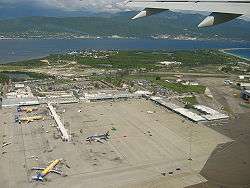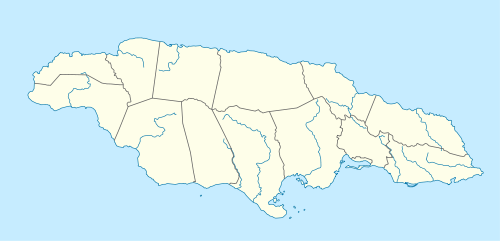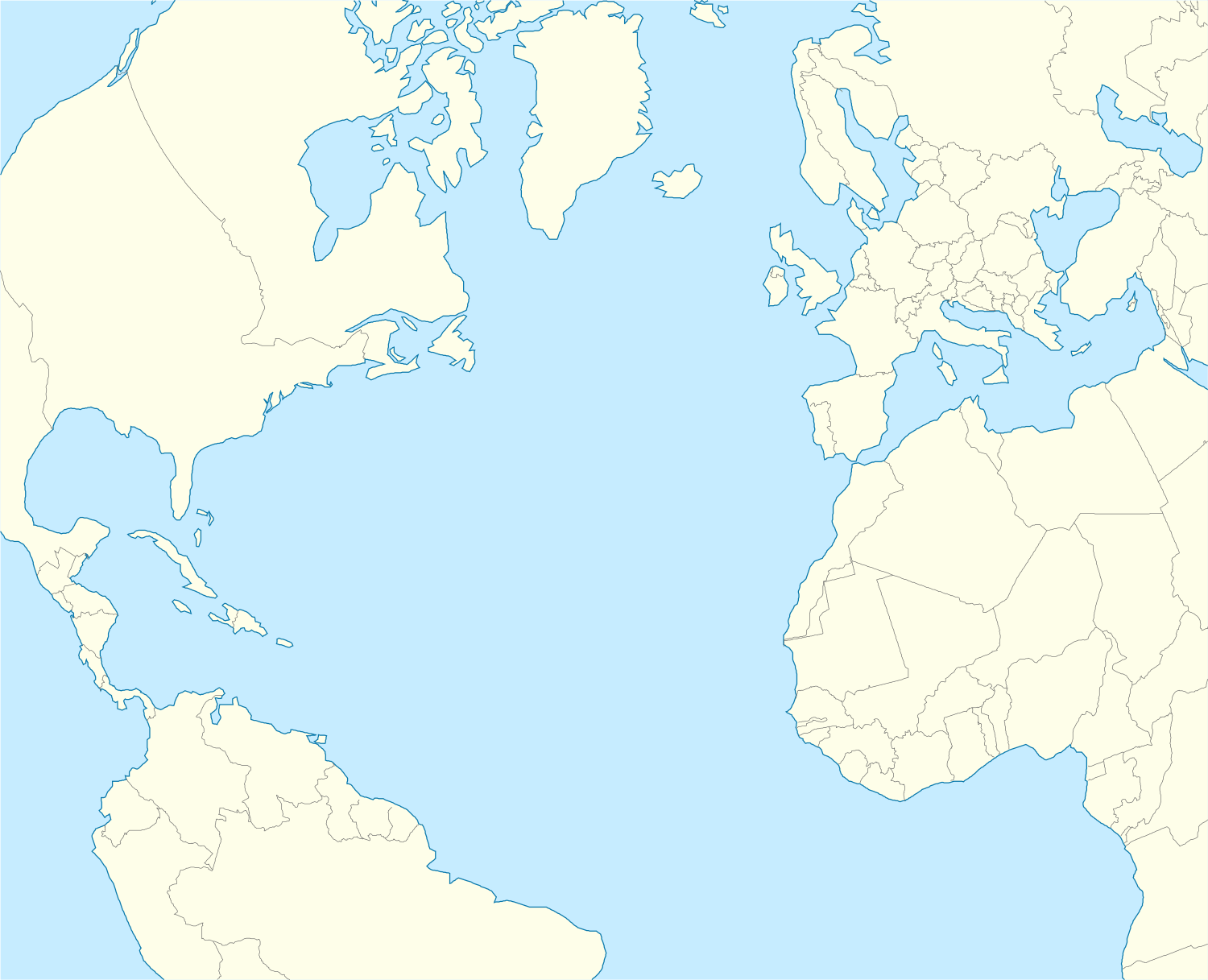Norman Manley International Airport
Norman Manley International Airport (IATA: KIN, ICAO: MKJP), formerly Palisadoes Airport, is an international airport serving Kingston, Jamaica and is located south of the island 19 km away from the centre of New Kingston. It is the second busiest airport in the country after Sangster International Airport, recording 1,819,200 arriving passengers in 2019. Over 130 international flights a week depart from Norman Manley International Airport.[3] Named in honour of Jamaican statesman Norman Manley, it is a hub for Caribbean Airlines. It is located on the Palisadoes tombolo in outer Kingston Harbour; it fronts the city on one side and the Caribbean Sea.
Norman Manley International Airport | |||||||||||
|---|---|---|---|---|---|---|---|---|---|---|---|
 | |||||||||||
| Summary | |||||||||||
| Airport type | Public | ||||||||||
| Operator | Grupo Aeroportuario del Pacífico | ||||||||||
| Serves | Kingston, Jamaica | ||||||||||
| Location | Palisadoes | ||||||||||
| Hub for | Caribbean Airlines | ||||||||||
| Elevation AMSL | 10 ft / 3 m | ||||||||||
| Coordinates | 17°56′08″N 076°47′15″W | ||||||||||
| Website | nmia.aero | ||||||||||
| Map | |||||||||||
 MKJP Location in Jamaica | |||||||||||
| Runways | |||||||||||
| |||||||||||
| Statistics (2019) | |||||||||||
| |||||||||||
History
Jamaica has long had a vibrant civil aviation industry, with the first flight reported in the island on 21 December 1911. This was eight years after the world recorded its first powered flight by the Wright brothers. Nineteen years later, on 3 December 1930, the first commercial flight, a Consolidated Commodore twin-engine flying boat operated by Pan American Airways (which eventually became Pan American World Airways), landed in Kingston Harbour.
The year 1934 was also another historic period for the nation's aviation industry when Dr. Albert Edward Forsythe and C. Alfred "Chief" Anderson (the fathers of African American aviation) arrived in Jamaica from Cuba. This was the first time a land plane arrived at the island by air.
The significant growth in the aviation sector led to the establishment of the Civil Aviation Department (CAD) in 1947. One year later, in 1948, the Kingston Air Traffic Control Centre (KATCC) was established. In the same year the Palisadoes Airport (now Norman Manley International) and the Montego Bay Airport now Sangster International Airport were established.
The airport was featured in the first James Bond film, Dr. No (1962).
Renovation
Existing terminal renovation
The contract relating to additions and alterations to the departure concourse has been awarded to Kier Construction Limited and is valued at $161.5M. The work will include construction of a new canopy, north of the existing check-in concourse and departure lounge; construction of an additional drop-off pavement area and provision for access by wheelchair passengers; new lifts, electrical air conditioning, public address, fire detection and fire fighting services; and alterations to the existing check-in concourse and mezzanine level to include a new security post and postal agency.
The architect / engineer for the designs are Llewelyn Davies, Jabobs Consultancy & Leading Edge Aviation Planning Professionals Limited (LEAPP), in conjunction with Peter Jervis and Associates Limited and Grace Ashley and Associates.
Masterplan
The project seeks to increase the airport's capacity to cater for projected air and passenger traffic at an acceptable level of service to the year 2023. The project is part of a 20-year masterplan which will be implemented in three phases (1A, 1B and 2) and will cost about $130M. By 2022 it will have involved a virtual reconstruction of the entire airport.
The first phase of construction and renovation was completed in 2007. Construction started in June 2006; the intention is for the first phase – which is supposed to make the airport an IATA category C airport – was completed in 2007. The European Investment Bank is providing $40M (2006) for the project and the Caribbean Development Bank has approved a loan of $11m (June 2006) for the new project.
Phase 1A
Phase 1A commenced planning in 2004 and was completed in 2007, at an estimated cost of $80M (ground-breaking took place in September 2006). This phase comprises a new departures building at the eastern end of the present terminal to accommodate expansion to the present departure concourse, security screening station with space to accommodate explosives detection equipment, out-going immigration, retail concessions and departure lounge.
Additionally a new multi-level passenger finger (pier) that enables the separation of arriving and departing passengers, as required by security regulations, was included.
Other items in this phase included:
- Nine passenger loading bridges at the new finger (pier)[4]
- Upgraded roadway system and expanded public car park
- Major rehabilitation of the existing departures concourse and related underground services infrastructure
- Major rehabilitation and upgrading of the terminal arrivals area, including immigration hall, customs hall, arrivals arcade, arrivals duty-free shops and offices
- Replacement and upgrading of airport systems – public address, access control, flight information, baggage information, security control and other airport IT systems
- Cargo warehouse complex (the first phase of this complex, called the NMIA cargo and logistics centre, was completed in 2005)[5]
Phase 1B
Phase 1B was completed in 2010 and costed approximately $23M. Works under this phase included:
- Further upgrading of existing buildings
- Construction of a new arrivals area
- Installation of new baggage handling facilities
- Movement of the General Aviation Centre, the fire station and other support facilities
- Airside works including the expansion of aircraft parking stands
- Extension of the cargo and maintenance taxiway
Airlines and destinations
Passenger
| Airlines | Destinations |
|---|---|
| Aerogaviota | Havana, Santiago de Cuba |
| Air Canada Rouge | Toronto–Pearson |
| American Airlines | Miami |
| British Airways | London–Gatwick |
| Caribbean Airlines | Antigua, Barbados, Fort Lauderdale, Grand Cayman, Miami, Nassau, New York–JFK, Port of Spain, Saint Maarten, Toronto–Pearson Seasonal: Orlando |
| Cayman Airways | Grand Cayman |
| Copa Airlines | Panama City (resumes September 4, 2020)[8] |
| Delta Air Lines | Atlanta |
| InterCaribbean Airways | Havana, Montego Bay, Providenciales, Santiago de Cuba, Santo Domingo-Las Americas |
| JetBlue | Fort Lauderdale, New York–JFK |
| Sky High | Santo Domingo-Las Americas [9] |
| Spirit Airlines | Fort Lauderdale |
| WestJet | Toronto–Pearson |
Cargo
| Destinations map |
|---|
 Kingston-Norman Manley Antigua Fort Lauderdale Atlanta Destinations from Norman Manley International Airport Red = Year-round destination Green = Seasonal destination Black = Cargo destination Orange = Passenger & cargo destination |
Accidents and incidents
- On 10 April 1953 a Lockheed Lodestar piloted by Captain Owen Roberts lost an engine on takeoff, climbed to 100–200 feet entering a slight banking turn and crashed into the sea. The failure of the left engine which was proven to be due to the cracking of the accessory drive gear. 13 on board, including the pilot, were killed. There was only one known survivor.
- On 17 July 1960, the captain of a Vickers Viscount of Cubana de Aviación hijacked the aircraft on a flight from José Martí International Airport, Havana to Miami International Airport, Florida. The aircraft landed at Palisadoes Airport where the captain claimed political asylum.[10]
- On 22 December 2009, American Airlines Flight 331 overshot the runway shortly after 10.00pm during a heavy rain storm and resulted in the Boeing 737-800 breaking up into three pieces and finally coming to a stop approximately 15–20 feet from the sea. All passengers and crew exited the aircraft safely.[11]
References
- Airport information for MKJP at World Aero Data. Data current as of October 2006.Source: DAFIF.
- Airport information for KIN at Great Circle Mapper. Source: DAFIF (effective October 2006).
- "Norman Manley International Airport: Development Programme". Archived from the original on 25 September 2009. Retrieved 5 October 2007.
- "Norman Manley Airport to double boarding bridges – ThyssenKrupp to get $149M contract". Jamaica Gleaner.
- "New NMIA Departure Facility has Significantly Improved Travel Experience – Minister Henry". Ministry of Transport & Works KINGSTON (JIS). 23 October 2008.
- Airport Technology – Norman Manley International Airport (KIN/MKJP), Kingston, Jamaica
- "New Passenger Facilities Unveiled at NW Manley Airport". Office of the Prime Minister. 6 July 2007.
- "Copa Airlines would restart its flights to these international destinations". Nicolás Larenas (in Spanish). July 2020. Retrieved 4 August 2020.
- https://skyhighdominicana.com/destinations/
- "Accident description". Aviation Safety Network. Retrieved 8 September 2009.
- "Norman Manley Airport Resumes Operations". Government of Jamaica. Retrieved 23 December 2009.